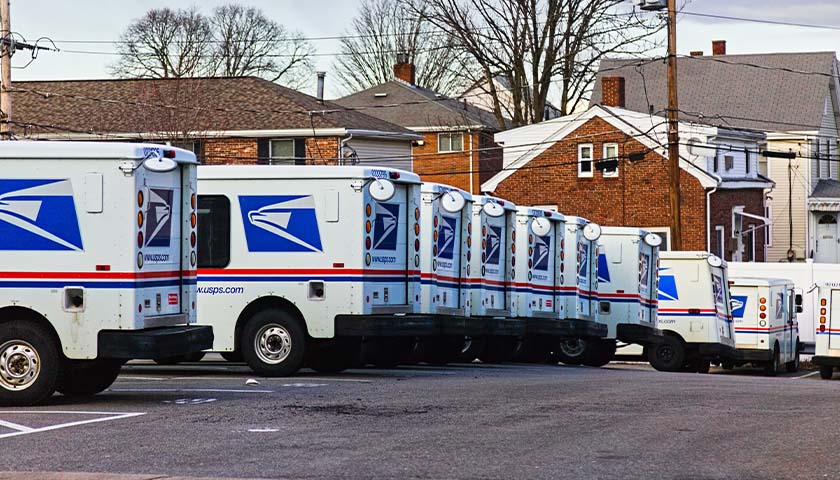According to the director of the nonprofit Amistad Project, the U.S. Postal Service has yet to release a report on thousands of ballots allegedly driven from New York to Pennsylvania in 2020.
The allegations originated from York, Pennsylvania, resident Jesse Morgan, a driver who said he made out-of-state deliveries for a USPS contractor. In an affidavit signed on November 26, 2020 and in a press conference on December 1, 2020, Morgan described delivering 24 large cardboard boxes filled with trays containing “completed ballots” from Bethpage, New York to Lancaster, Pennsylvania on October 21, 2020.
Morgan described the volume of the ballots and the events transpiring that day as suspicious, and some have cited his attestations as evidence of election fraud. His statement was presented as evidence in the lawsuit filed by State Representative Daryl Metcalfe (R-PA-Cranberry Township) and other legislators challenging the 2020 presidential-election result.
Phill Kline, a Republican former Kansas attorney general who directs the Amistad Project, an election watchdog group operating out of a public interest law firm called the Thomas More Society, said his organization provided USPS with evidence and sought an investigation. He said the postal agency showed no interest in the information it was given and has not disclosed its report on the matter, despite having told Amistad that such a document was composed.
“We’re trying to seek the report, but they’ve refused to release it thus far,” Kline told The Pennsylvania Daily Star. “But we’re still working to get it.”
A document obtained by The Daily Star on Monday contains a USPS analysis of the events of October 21, 2020. It said it “could not corroborate [Morgan’s] allegation of missing ballots.”
Kline said the information Amistad provided to USPS included text message transcripts from a USPS expeditor in Bethpage Morgan said he dealt with on the day he hauled the ballots. But, Kline added, the agency never contacted that person to discuss the matter. He said that Amistad also obtained affidavits from others familiar with USPS shipping processes but that, to the nonprofit’s awareness, postal officials didn’t acquire any evidence or reach out to any witnesses other than Morgan’s mother and his former wife.
“What we had corroborated what Jesse was saying, but the postal inspector never even asked for it,” Kline said. “I offered it; he never called back and asked for it.”
Morgan, in his sworn statement, initially hesitated to estimate how many ballots occupied the 24 bins he said he shipped. He supposed “there could be 750 or there could be 7,500.” Kline said Amistad consulted with an investigator who considered what kind of containers Morgan said were in use during that trip and recreated the packaging process, ultimately estimating that the load of ballots could number in the hundreds of thousands and possibly exceed 280,000.
Kline also said he consulted with postal experts who delineated ways in which such a hefty shipment of allegedly fraudulent ballots could be taken in from out of state and delivered for counting in an election. He recalled the experts identifying two insertion points that could conceivably have let in such a shipment, one of them matching the Bethpage location at which Morgan said he picked up the containers.
Among the unusual events that Morgan recalled during his trip included USPS employees instructing him to unload no containers in Harrisburg, his first stop in Pennsylvania, and to offload all of the bins in Lancaster instead. That is despite some of the boxes being designated for delivery to Harrisburg. He also said he was forced to wait about six hours at the Harrisburg distribution center before being directed to leave for Lancaster.
Morgan also said his trailer disappeared the following day and he was never permitted to use it again.
Morgan’s credibility drew heavy scrutiny after he made his allegations, with reports coming out on his past drug abuse, criminal history and interest in investigating paranormal activity. His legal record included a 2006 conviction for forgery for which he served 192 days in Adams County Prison. His ex-wife had filed for three temporary protection-from-abuse orders in 2019, one of which Morgan was found guilty of breaching.
Kline said that Morgan, despite not knowing that Kline had ascertained these aspects of his past via a background check, was forthcoming about them and did not try to explain them away, as Kline says a dishonest person would. Kline also said Morgan knew that coming forward would force his past into the spotlight and he did so anyway.
“Jesse had nothing to gain from coming forward,” Kline said.
He went on to say that he believes the media focus on Morgan’s background reflects a disturbing current tendency to impugn someone who raises important questions.
“I’m not saying there were 200,000 or a quarter million fraudulent ballots,” he said. “I’m saying there’s a guy who had ballots who went from Bethpage to Pennsylvania and we deserve an answer as to why.”
The USPS issued the following written statement: “The U.S. Postal Service is committed to the secure, timely delivery of the nation’s Election Mail in the 2022 election cycle. Regarding questions about ballots in Bethany [sic], NY; and Harrisburg and Lancaster, PA; we referred that matter to the U.S. Postal Service Office of the Inspector General.”
– – –
Bradley Vasoli is managing editor of The Pennsylvania Daily Star. Follow Brad on Twitter at @BVasoli. Email tips to [email protected].





